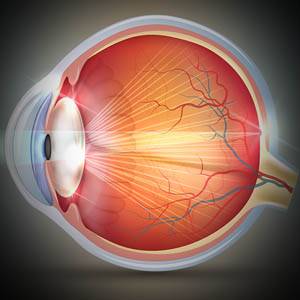An estimated 15 percent of women experience vision changes during pregnancy.
Pregnancy can bring about many different changes in your body. These changes, although sometimes uncomfortable, are usually completely normal and just a way of your body trying to cope with fluctuating hormones, and changes in blood circulation— both physiological changes that help your baby to grow and remain healthy inside your womb.
Most moms-to-be are well aware of the bodily changes that remind you on a daily basis that you are expecting— the most common being: morning sickness, food aversions, heightened sense of smell, swollen ankles, headaches, exhaustion, and many other uncomfortable yet normal pregnancy symptoms.
What you may not know is that these physiological changes that take place during pregnancy can also lead to changes in your eyes and vision.
Dry eye syndrome
Dry eye syndrome can develop when the quantity or quality of your tears is impacted by the pregnancy hormones in your body.
If your eyes do not receive the necessary lubrication from the tears, dry eyes will result and vision will be affected.
Symptoms:
- Excessive tearing
- Occasional blurry vision
- Itchy eyes
- Burning
- Red eyes
In most cases, dry eye syndrome can be treated with over-the-counter (OTC) artificial tears eye drops and warm compresses.
If these drops are not strong enough to relieve your symptoms, your eye doctor can prescribe an anti-inflammatory eye drop as well.
Caution: Always consult with your doctor before using any type of medicated or natural eye drop during pregnancy.
There are also natural home remedies that you can use to help relieve dry eye symptoms:
- Give your eyes a gentle massage to encourage tear production.
- Practice eyelid hygiene.
- Moisten your face and eyes with a natural rosewater mist to rejuvenate your eyes throughout the day.
Practice these tips to help prevent dry eye syndrome:
- Drink plenty of water
- Include a variety of fresh fruits and vegetables in your diet
- Take your prenatal vitamins regularly
- Purchase a humidifier to provide moisture in your home and office
- Wear sunglasses that protect your eyes from sun and wind
- Reduce the amount time you spend in front of your computer screen or any other digital device
Blurry vision
You may be familiar with the way your body retains water these days, causing your feet, ankles, and fingers to swell.
What you may not realize is that fluid retention can also occur in your eyes, increasing the pressure within your eyes and leading to blurry vision.
When your eyes retain fluid, your corneas can thicken and change shape. This in turn, can impact the way your eyes refract or bend light and lead to blurred vision.
While you may think that it is time to change your optical prescription, most eye doctors recommend waiting until after delivery to make any changes to your optical prescription— generally because your vision will likely return to normal after you give birth.
For this reason, most eye doctors also recommend waiting until after delivery to be fitted for contact lenses or to have laser eye surgery.
If your vision is changing during pregnancy, contact an eye doctor near you, who can diagnose and discuss the best options for you.
SEE RELATED: Pregnancy Complications: When to See an Eye Doctor
Migraines
Migraine headaches are common in pregnancy and can cause visual auras before the onset of a headache or during the headache itself.
Visual auras typically cause the following visual disturbances:
- Blind spots
- Flashing lights
- Zig-zagging lines
- Temporary vision loss
Some women experience these visual changes without the migraine headache.
If you are experiencing migraine headaches with or without visual disturbances, speak to your primary care physician about which medications are safe to take during pregnancy.
Pink eye
Pregnancy weakens your immune system and makes you more susceptible to different types of infections.
For this reason, many pregnant women develop conjunctivitis, commonly known as pink eye.
If you are experiencing any of the following symptoms, schedule an appointment with your eye doctor as soon as possible to promptly treat the infection.
- Red or pink eyes
- Eye pain
- Burning
- Itching
- Soreness
- Yellow discharge from eye
- Crust around eyelid margins
When to see an eye doctor during pregnancy
While vision changes are a common occurrence during pregnancy, doctors recommend scheduling an eye exam to rule out anything more serious that may be causing your visual disturbances.
Be sure to report all vision changes you may be experiencing, especially if you notice any double vision, flashing lights, or floaters, as these may be signs of a more serious problem.
Pregnancy-related complications, such as preeclampsia and gestational diabetes, can also cause vision changes and should be diagnosed and treated as soon as possible to protect your health and the health of your baby.
How can I improve my vision during pregnancy?
Vision changes that develop during pregnancy will typically disappear on their own, within a few weeks or months after delivery.
If your vision remains blurry, or you experience new vision changes after your baby is born, your eye doctor may want to recheck your eyes and vision to rule out any other problems.
Meanwhile, try the following suggestions to help your vision remain as comfortable as possible.
Take a break from contact lenses
Wearing your contact lenses may exacerbate blurry vision.
Fluctuating hormones can change the shape of your cornea, where the contact lens is placed, and can affect the way your contact lenses fit on your eyes.
If you notice that your vision is more blurry with contact lenses, switching to eyeglasses for a few months until your baby is born may be a good idea.
If you would rather not give up your contact lenses, ask your eye doctor about switching to a daily disposable or scleral contact lens— both of which are recommended for patients who suffer from dry eye symptoms.
Rest your eyes
When your eyes are tired, you are more likely to experience blurry vision.
If you spend many hours on the computer or any other digital device, your eyes can get tired.
- Take frequent breaks from the screen.
- Follow the 20-20-20 rule, every 20 minutes, look 20 feet away for 20 seconds.
- Adjust the color and brightness on your screen
These small changes can help to make screen time more comfortable for your eyes.
In addition, don’t forget, getting a good night’s sleep will also help your eyes to rest from a long day, and can be beneficial for your eye health and vision.
Consume a healthy diet
Pregnancy is the time to nourish your body with a variety of healthy foods that contain the vitamins and nutrients your body craves.
Be sure to include lots of fruits, vegetables, fish (with omega-3) such as salmon and sardines, and a variety of healthy nuts in your diet.
It is also important to drink plenty of water and get lots of rest.
All of these healthy tips will help to keep you and your growing baby healthy throughout your pregnancy and make it easier for you to adjust to your new lifestyle after your baby is born.
Not only will your body thank you, but your eyes will see better too.
It is important to remember that every pregnancy is different and every pregnant woman will experience varying symptoms and physical changes.
If you have any questions or concerns about your eyes or vision during your pregnancy, never hesitate to reach out to your eye doctor.
LEARN MORE: Guide to Eye Health
If your vision is changing during pregnancy, contact an eye doctor near you, who can diagnose and discuss the best options for you.










